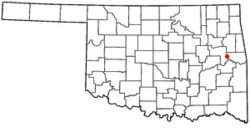Gore, Oklahoma facts for kids
Quick facts for kids
Gore, Oklahoma
|
|
|---|---|

Location of Gore, Oklahoma
|
|
| Country | United States |
| State | Oklahoma |
| County | Sequoyah |
| Area | |
| • Total | 2.29 sq mi (5.92 km2) |
| • Land | 2.28 sq mi (5.91 km2) |
| • Water | 0.00 sq mi (0.01 km2) |
| Elevation | 535 ft (163 m) |
| Population
(2020)
|
|
| • Total | 951 |
| • Density | 416.56/sq mi (160.83/km2) |
| Time zone | UTC-6 (Central (CST)) |
| • Summer (DST) | UTC-5 (CDT) |
| ZIP code |
74435
|
| Area code(s) | 539/918 |
| FIPS code | 40-30300 |
| GNIS feature ID | 2412692 |
| Website | www.townofgore.org |
Gore is a small town in western Sequoyah County, Oklahoma, United States. It is part of the Fort Smith, Arkansas-Oklahoma Metropolitan Statistical Area. In 2020, about 951 people lived there.
Gore is known as the "trout capital of Oklahoma". You can find great fishing in Lake Tenkiller, the Illinois River, and the Arkansas River.
Contents
History of Gore
This area started as a small settlement in what was then called Indian Territory. It was first known as Campbell. This name came from Dr. W. W. Campbell. He and Joe Lynch ran a ferry that helped people cross the Arkansas River.
A very important place for the Cherokee Nation–West was also nearby. Their capital, Tahlonteskee, was just two miles north of where Gore is today. In 1829, John Jolly, a chief of the Cherokee Nation–West, built his home here.
Early Days and the Railroad
The settlement was also called Illinois Station. It was a stop for stagecoaches traveling between Fort Gibson and Fort Smith. In 1888, a post office named Campbell opened at Dr. Campbell's store. That same year, the St. Louis, Iron Mountain and Southern Railway built a train line through the settlement. This railway later became the Missouri Pacific Railway.
By 1909, the town was growing. It had a bank, two lumber companies, a flour mill, and places to buy things. It also had two hotels.
Name Change and Growth
The town's name changed to Gore on October 22, 1909. This was to honor Oklahoma Senator Thomas Gore. He was one of Oklahoma's U.S. senators right after Oklahoma became a state. Sadly, a fire destroyed most of the town's businesses in 1909. By 1910, Gore had a population of 319 people.
There was a plan in 1917 for a second train line. Congress approved building a bridge over the Arkansas River from Webbers Falls. However, this plan did not happen, and the railroad was stopped in 1918.
Population Information
| Historical population | |||
|---|---|---|---|
| Census | Pop. | %± | |
| 1910 | 316 | — | |
| 1920 | 329 | 4.1% | |
| 1930 | 297 | −9.7% | |
| 1940 | 334 | 12.5% | |
| 1950 | 387 | 15.9% | |
| 1960 | 334 | −13.7% | |
| 1970 | 478 | 43.1% | |
| 1980 | 445 | −6.9% | |
| 1990 | 690 | 55.1% | |
| 2000 | 850 | 23.2% | |
| 2010 | 977 | 14.9% | |
| 2020 | 951 | −2.7% | |
| U.S. Decennial Census | |||
In 2000, Gore had 850 people living there. There were 368 households, which are groups of people living together. Most households were families.
The people in Gore came from different backgrounds. About 68.6% were White, and 24.7% were Native American. A small number were from other groups. About 0.8% of the population was Hispanic or Latino.
Age and Income
The population in Gore included people of all ages. About 23.9% were under 18 years old. About 18.5% were 65 years or older. The average age in the town was 42 years.
In 2000, the average income for a household in Gore was $27,266 per year. For families, the average income was $37,000 per year. About 16.6% of the people in Gore lived below the poverty line. This included 18.2% of those under 18 and 21.1% of those 65 or older.
Notable People from Gore
Many interesting people have connections to Gore:
- Agnes Cowen (1927–1999) was a member of the Cherokee Nation Tribal Council.
- Thomas Gore, a U.S. Senator, is the person the town is named after.
- Joshua Morrow, an actor from the TV show The Young and the Restless, went to school in Gore for a short time.
- Steve Owens, a famous football player who won the Heisman Trophy in 1969, was born in Gore.
- G. Steven Rowe, who became the Attorney General for the State of Maine, is from Gore.
- John Whisenant, a professional basketball coach, was born and grew up in Gore.
See also
 In Spanish: Gore (Oklahoma) para niños
In Spanish: Gore (Oklahoma) para niños

